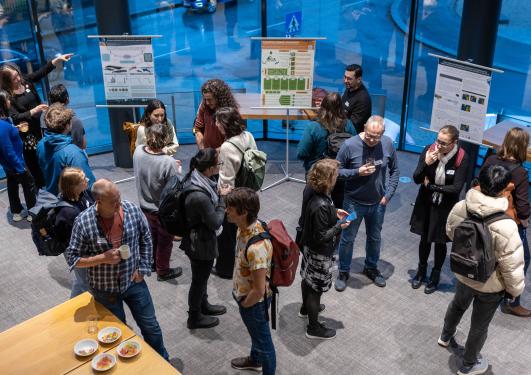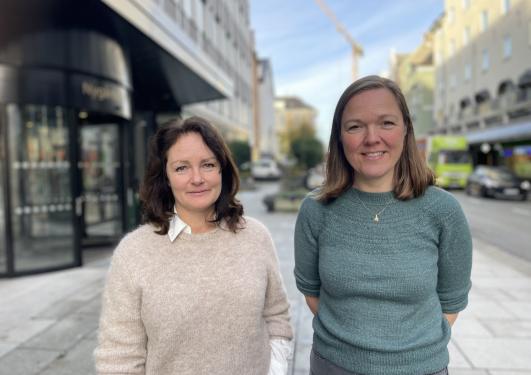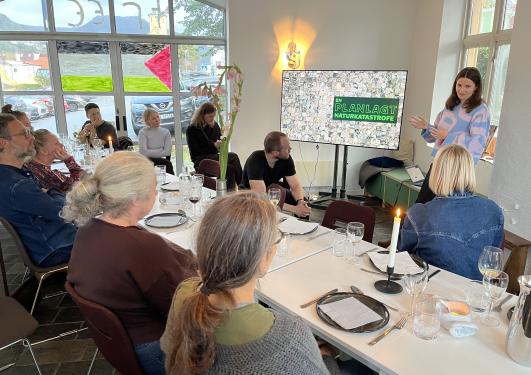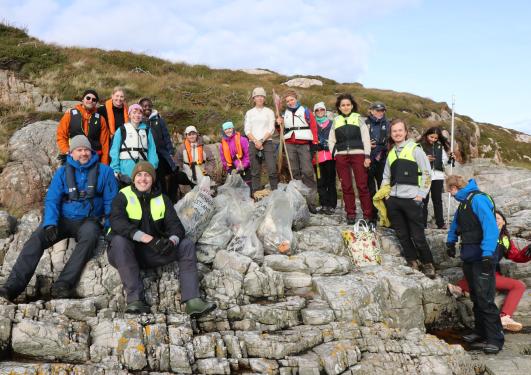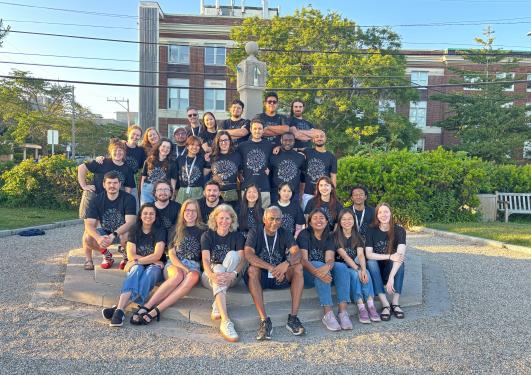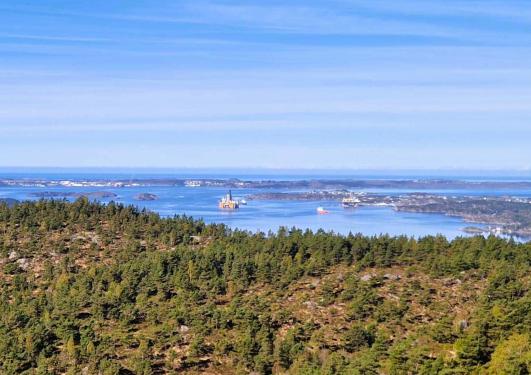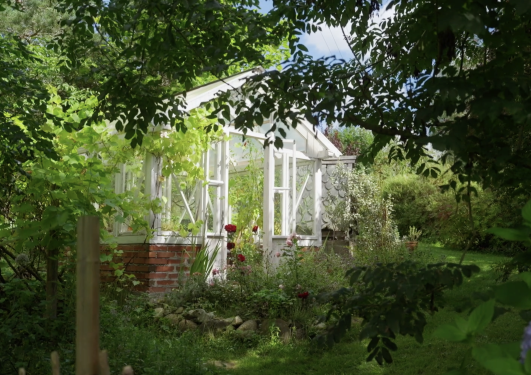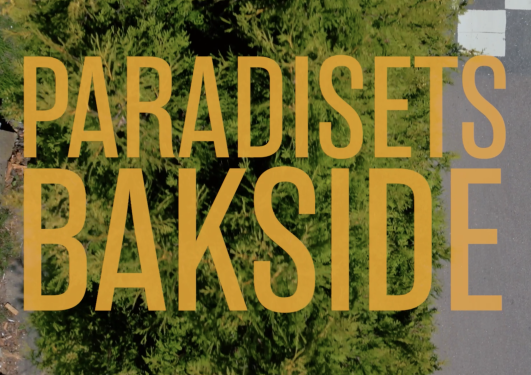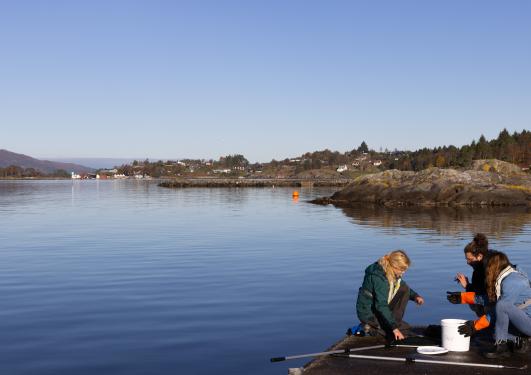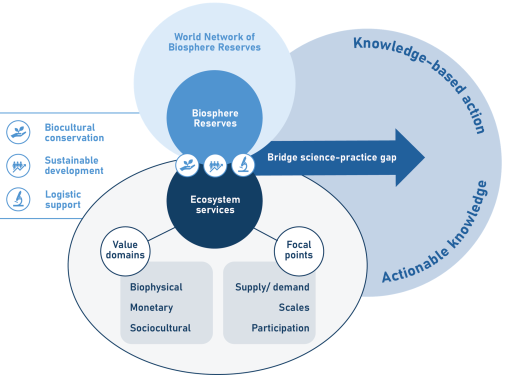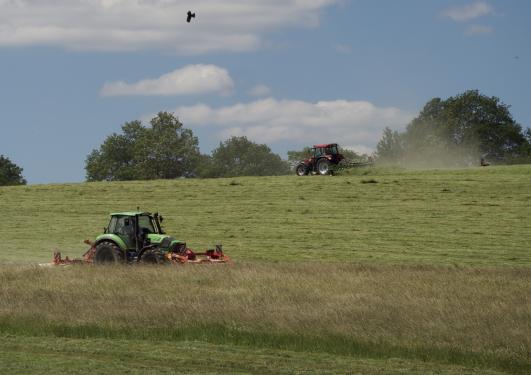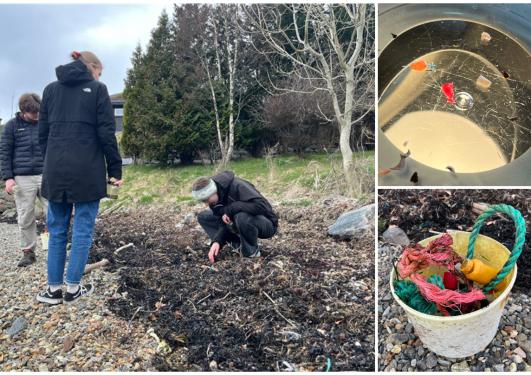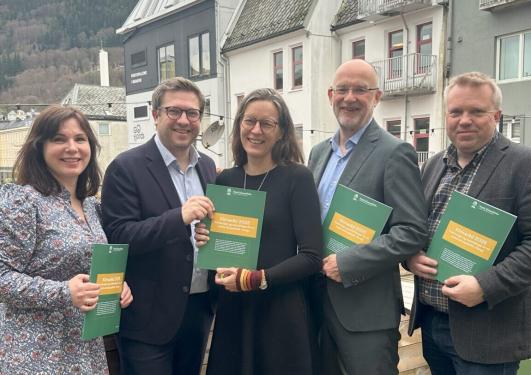News archive for Department of Biological Sciences (BIO)
From deep-sea research to biomedical advances, the event created valuable connections across the local biological sciences community.
Sea lice and bacterial diseases are among the biggest challenges in Norwegian aquaculture. Now, two researchers at the University of Bergen have received funding from the Research Council of Norway to develop new knowledge that can improve fish health and strengthen sustainability in the industry.
As part of the transdisciplinary collaboration between science, arts, and local communities within the ACTIONABLE research project, the first NIMBLE WEAVERS Kitchen Dinner took place on 21st September 2025, at Hordaland Kunstsenter.
On September 25th, the University of Bergen (UiB) organized a coastal cleanup for students and staff. As last year, the destination was Lisle Lyngøy, often referred to as “Plastic Island” off the coast of Hellesøy. The day was filled with strong impressions — and some good news for the island’s ecosystem.
A new report has just been launched highlighting how to accelerate the Kunming-Montreal Global Biodiversity Framework through a network of sites working for sustainability and nature conservation.
This summer, PhD candidate Max Jordi Makem Pekouankouang from the Christiaen group at the Michael Sars Centre attended the prestigious Embryology course at the Marine Biological Laboratory in Woods Hole, USA. He shares how this experience transformed his approach to science.
Judging by the political debate in Norway, it may seem as if the nature crisis is over. But is that really the case?
In late June 2025, Janne Thomsen, PhD Candidate with the ACTIONABLE project, participated in the ISEE Summer School on Justice within Planetary Boundaries and presented her ongoing research at the ISEE Degrowth Conference in Oslo, which focused on Building socially just postgrowth futures - linking theory and action.
Norwegian gardens have gone from being full of fruits and berries to becoming flat lawns with trampolines and gas grills. “We have gardens that demand more, but give less back to nature,” says Professor Kyrre Kverndokk.
How is your garden related to the Anthropocene? This rather large question is the starting point of the documentary “Paradisets bakside”, now available with both Norwegian and English subtitles on Viten-TV.
The Michael Sars Centre is launching a Visitors Program designed to foster scientific exchange and collaborations across disciplines.
PhD candidate Janne Thomsen and researchers Jarrod Cusens and Inger E. Måren from UiB's UNESCO Chair on Sustainable Heritage and Environmental Management recently had their review paper published in Current Opinion in Environmental Sustainability. The paper reviews recent ecosystem services approaches in the World Network of Biosphere Reserves and explores how ecosystem services research supports... Read more
Peter Manning was awarded an NFR grant as part of the transnational Agroecology Partnership program.
On April 8–9, 2025, our team had the pleasure of organizing and participating in a hands-on student workshop on microplastics, hosted at the Espeland Marine Biological Station. Nestled by the coast just a short trip from Bergen, this site provided a perfect setting for students from the BIO316 course to immerse themselves in a critical issue facing our oceans: microplastic pollution.
The Norwegian green think tank Klimastiftelsen recently presented their report with recommendations for better green policy to the minister of research and higher education Sigrun G. Aasland. The report was written by the Climate Council 2025 (Klimaråd 2025), which included Vigdis Vandvik (CeSAM) and Kikki Kleiven (Bjerknes center) from UiB.
UNESCO Chair Inger Måren peer reviewed recent UNESCO report on how UNESCO sites can be utilized in education for sustainable development.
UiB's election campaigns are in full swing. But what do the two teams think about sustainability? How do we address big global and local challenges through our research, education and outreach? What are UiB's strengths and what can be improved?
In this debate, organized by CET, the Sustainability Pilots, and CeSAM, we ask Margareth Hagen, Sigrunn Eliassen, Lise Øvreås and Endre Tvinnereim... Read more
The University of Bergen (UiB) will host another seven international research fellows after a very successful application round in this year’s competition for MSCA funding from the EU. The grants will fund the researchers' stay at UiB for two years.
Pages
- December 2025 (1)
- November 2025 (1)
- October 2025 (1)
- September 2025 (3)
- July 2025 (3)
- June 2025 (2)
- May 2025 (2)
- April 2025 (2)
- March 2025 (2)
- February 2025 (3)
- January 2025 (2)
- December 2024 (3)
- November 2024 (5)
- October 2024 (4)
- September 2024 (4)
- August 2024 (6)
- July 2024 (2)
- June 2024 (4)
- May 2024 (7)
- April 2024 (5)
- March 2024 (3)
- February 2024 (8)
- January 2024 (3)
- December 2023 (4)
- November 2023 (4)
- October 2023 (4)
- September 2023 (6)
- August 2023 (4)
- July 2023 (1)
- June 2023 (3)
- May 2023 (3)
- April 2023 (1)
- March 2023 (3)
- February 2023 (6)
- January 2023 (5)
- December 2022 (1)
- November 2022 (2)
- October 2022 (2)
- September 2022 (2)
- August 2022 (1)
- July 2022 (3)
- June 2022 (2)
- April 2022 (2)
- March 2022 (1)
- February 2022 (6)
- January 2022 (3)
- December 2021 (1)
- October 2021 (1)
- September 2021 (1)
- June 2021 (3)
- May 2021 (3)
- April 2021 (1)
- March 2021 (2)
- February 2021 (2)
- January 2021 (1)
- December 2020 (2)
- October 2020 (1)
- September 2020 (1)
- July 2020 (2)
- April 2020 (1)
- March 2020 (1)
- February 2020 (1)
- December 2019 (2)
- November 2019 (2)
- June 2019 (3)
- May 2019 (3)
- March 2019 (1)
- February 2019 (3)
- January 2019 (1)
- December 2018 (3)
- November 2018 (4)
- October 2018 (2)
- August 2018 (1)
- June 2018 (1)
- May 2018 (4)
- April 2018 (1)
- March 2018 (1)
- February 2018 (1)
- January 2018 (1)
- November 2017 (2)
- October 2017 (2)
- September 2017 (1)
- June 2017 (1)
- May 2017 (1)
- March 2017 (3)
- January 2017 (3)
- December 2016 (2)
- November 2016 (3)
- October 2016 (1)
- September 2016 (2)
- June 2016 (1)
- May 2016 (2)
- April 2016 (2)
- February 2016 (6)
- January 2016 (4)
- December 2015 (7)
- November 2015 (3)
- October 2015 (2)
- September 2015 (2)
- August 2015 (2)
- July 2015 (1)
- June 2015 (2)
- May 2015 (2)
- April 2015 (1)
- March 2015 (1)
- February 2015 (5)
- January 2015 (1)
- December 2014 (1)
- October 2014 (1)
- September 2014 (5)
- July 2014 (1)
- June 2014 (1)
- May 2014 (3)
- March 2014 (1)
- February 2014 (2)
- January 2014 (2)
- December 2013 (3)
- November 2013 (2)
- October 2013 (4)
- September 2013 (4)
- August 2013 (3)
- July 2013 (1)
- June 2013 (2)
- May 2013 (5)
- April 2013 (5)
- March 2013 (1)
- February 2013 (2)
- January 2013 (3)
- December 2012 (1)
- October 2012 (2)
- September 2012 (3)
- August 2012 (2)
- July 2012 (2)
- June 2012 (2)
- January 2012 (3)
- December 2011 (2)
- November 2011 (4)
- October 2011 (1)
- September 2011 (7)
- July 2011 (3)
- June 2011 (4)
- May 2011 (1)
- April 2011 (2)
- March 2011 (3)
- February 2011 (1)
- January 2011 (2)
- November 2010 (3)
- October 2010 (1)
- September 2010 (4)
- August 2010 (2)
- June 2010 (3)
- May 2010 (2)
- April 2010 (3)
- March 2010 (1)
- February 2010 (4)
- January 2010 (5)
- December 2009 (1)
- September 2009 (1)
- August 2009 (3)
- July 2009 (1)
- June 2009 (5)
- May 2009 (3)
- March 2009 (2)
- February 2009 (1)
- January 2009 (2)
